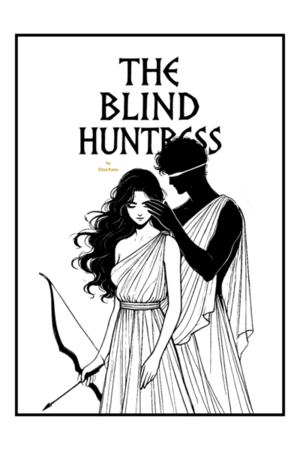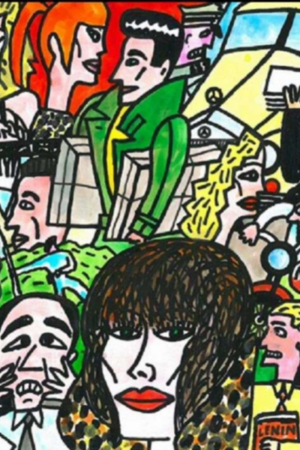Chapter 8:
EPILOGUE II: 1 Year Later (⚠️16+)
The Blind Huntress (short light novel)
EPILOGUE II
ΕΝ ΕΤΟΣ ΥΣΤΕΡΟΝ
1 Year Later
LATE AUTUMN, 407 B.C.E.
For the first time in four years, Mēlesía walked not as a shadow, but as a daughter returning to her family in Perisykē.
She had spent the last season waiting until she was certain—certain that the trade routes she had stitched into her village's future could hold without her, and certain that her presence was no longer required.
After walking the roads between many city-states, and after meeting more souls than she could count, she had come to another quiet decision: If Nýxios would take the hand of a mortal like her, she would offer it without hesitation.
However, before she could admit anything aloud, she needed to visit her father.
She walked the same trade road in Perisykē she had once traveled as a kid—the road she had helped rebuild, now lined with stalls and chatter.
She passed tables of tools, dried herbs, woven cloth, jars of preserved olives.
Every corner bore some small trace of her.
She moved through the village in full daylight and allowed the villagers to see her, walking among them as one of their own.
This time, people noticed. At first, only a few glanced up.
Familiar faces paused, frowning as if confused.
“Mēlesía?”
The first voice from her childhood came from Dion, the old miller. His hands were still dusted with flour as he stepped forward, eyes narrowing to search her face.
“Is it really you?”
The murmurs in the market began to grow.
More familiar heads turned.
“It’s Agrévōn's daughter!”
“By the gods—it's her!”
“Mēlesía, where in Hades have you been?”
She was surprised to see others remember her so easily.
Voices surrounded her. Hands reached for her shoulders.
A dozen people spoke at once, huddling close, their heat and breath rising like steam from a boiling pot.
It made Mēlesía’s skin prickle beneath the hot sun.
The baker's wife caught her in a sudden embrace. “You vanished like fog, girl! Look at you—alive, strong! Oh, praise the gods!”
Happy children swarmed around her, gripping her sleeves and braids. Some were familiar, others strangers, born after she had gone. They tugged at her sleeves and braids with dusty fingers.
“Did you go to the city?” one asked.
“Did you see the sea?” another chimed in.
“Will you stay for the winter?”
She had no answer that would satisfy any of them.
For years, she had walked unseen.
Now, she was known again.
She was … sad.
An older woman scoffed nearby. “Forget all that! Her father’s been waiting. Go to him, child! He asks about you each season.”
“Yes, go!”
“Poor man sits outside all day just to watch the road for you! Go on!”
⁂
Mēlesía found her father outside her childhood home, just as always—his thick wool cloak pulled tight around his shoulders against the crisp autumn air.
He hadn’t seen her yet.
He stood by the low stone wall beside the house, quietly gathering dry vine cuttings into a worn wicker basket.
The grape leaves had already turned and fallen, leaving only the bare, twisted vines behind.
When their eyes met, he didn’t speak.
Instead, he simply nodded, a gentle smile softening his weathered face, and opened one arm in welcome—the same way he had when she was small.
Over the next three days, they shared meals by the hearth, speaking only of village things—how the terraces had fared, which families had left or arrived, a hunter nearly killed by a wild boar, how the goats had finally taken to the new fields.
He spoke as though she had never been gone.
On the third night, as they sat beside the hearth with the fire crackling quietly, he finally asked the question she had known, for years, would one day come.
“Were you safe?”
Mēlesía turned her clay cup between her fingers slowly.
There were truths she could not speak; business dealings too risky.
Her father waited. He was patient man.
“I stepped onto a path that wasn’t mine,” she began, choosing each word with care. “I was given … wealth that wasn’t mine. I couldn’t let it … remain only with me.”
She could see him measuring the spaces between her words.
He did not press her.
After a long pause, he leaned back, rubbed one knee with the palm of his hand, and said only, “How long will you stay?” as he reached forward to stir the hearth fire with a blackened olive branch kept beside the stones.
Nýxios’ obol of love pressed against Mēlesía’s hip through the folds of her belt.
“I’ll return again, father. I promise,” she said. “Maybe then ... I’ll be able to explain more, or at least try.”
He gave a slow, thoughtful nod, his gaze steady on the small fire within the hearth.
“There are new tales these days,” he said, his voice still even. “They say prosperity in Perisykē began after an unknown merchant left the village. They claim the goats started to breed faster, the plows cut cleaner, grain sprouted where no one remembered sowing. Many are starting to believe the merchant took a village curse with him when he left, saving the village.”
Mēlesía stared at the fire.
“Some say he was the potter's son. Others say he was touched by spirits,” he said, his eyes drifting toward the newly installed door of his home, which Mēlesía had commissioned last season. “Only the gods know I've been very lucky. Barley at the door when I needed it. A new plowhead before winter. I'm a simple man. Fortune must favor old fools.”
She found herself wondering whether fortune did, in fact, favor fools. She had been one herself—the moment she had received this godlike wealth, the moment her life had changed.
What had she truly understood about life back then?
“You taught me how to hunt,” she replied. “My father is no fool.”
Agrévōn gave his daughter a small smile.
The urge to speak of Nýxios rose in her throat. She wanted to tell her father how deeply she loved him. She wanted to tell him everything.
However, she couldn't. Nýxios was no mortal. He was a god.
Would her father warn her, bless her, call her foolish, ask for proof?
The risk of losing him was already too great.
“You’ve already promised to return,” her father said gently, watching the conflict pass through her eyes. “That’s enough for me.”
Her throat tightened. She smiled anyway. "Thank you, father."
⁂
Mēlesía moved swiftly through the autumn hills and forest outside Perisykē.
The path to the fig trees wound ahead of her—only seconds away.
Her cloak fluttered behind her.
Nýxios…
Four years. She had not spoken to him in four years.
She wasn’t watching the road.
Her focus was on the future.
On Nýxios.
There were no crystals or minerals left. Everything he had offered, she had turned outward—bartered, traded, reinvested, built.
Without a doubt, she had lived exactly how she wanted to for the past four years, doing what she could as a mortal.
Now, she wondered if she could chase something else.
She reached the final curve in the path—where the trees grew thick and wild, where people refused to go.
The ring of fig trees stood ahead, just as she remembered, as if waiting for her.
Some claimed Nýxios had shaped it himself. She didn’t know. Perhaps he had.
Unlike years ago, she did not pause in front of it.
She ducked through a narrow gap between the trunks and stepped inside the ring.
A gust of wind swept across her cheeks, lifting her hair gently.
“How I’ve longed to hear those steps again…”
Her heart stammered. It was Nýxios’ voice—low, honeyed—coming from somewhere, or everywhere, within the vast ring of fig trees.
Just as she remembered.
“Nýxios … where are you?”
“You know what must be given, don’t you?”
She nodded without hesitation.
“Hurry,” she insisted.
A second later—just like years ago—her vision dissolved.
She stood blind, once again, and smiled widely with relief.
The human weight of worry and fear she had carried for years was gone.
Nýxios’ domain reopened to her.
She maneuvered through the forest with comfort—seeing without seeing—through rhythm and pull. She could feel him nearby—his location, his shape—she didn’t know how she did, but she did.
Her feet found their way.
When a root pushed up through the soil, she stepped over it.
When a low branch brushed her shoulder, she ducked beneath it.
Though blind, Mēlesía moved through the forest as if she saw every tree and stone.
From the shadows, Nýxios watched her, astonished. She walked his paths without hesitation.
So much had changed in her, so quickly.
He didn’t move. He wanted to see what she would do, how far she would go.
When she reached him, he let her collide with him, head-first into his chest.
He closed his eyes at the sudden, blissful weight.
“Found you!” she cheered, her voice muffled by his shoulder. She wrapped her arms around his neck and squeezed him tightly.
He wore what Mēlesía imagined could only be a godlike chiton. It was soft like water against her skin. Maybe silk. She wasn't sure.
His arms tightened around her waist.
Her heart stuttered.
“Look at you,” he murmured against her ear. “You’ve evolved.”
As he held her tightly, she could not help but think: if he offered her an hour, a day, or a month, she would take it, without question.
“I missed you so much...” she breathed.
He leaned in, resting his forehead against hers. “I missed you too,” he murmured. “You gave what no one asked of you, without a single utterance of praise. You took the long road beautifully.”
“I wished it for myself. For my father, too…”
“No matter how humbly you speak of it, you lived in my image, unseen, never forgetting me. You were always meant to be mine, Mēlesía.”
His hands slid down her sides, until they reached her belt. His fingers paused there, warm.
She sucked in a breath.
“Tell me, how many times did it fall?”
“What…?”
Her hand moved instinctively to meet his.
She felt it, exactly where she had hid it, his obol of love, still securely tucked into her belt.
“You…”
“I wasn’t allowed to always become directly involved,” he admitted. “So, I gave it a few small nudges.”
Her eyes widened. “I knew there was nothing wrong with my stitching…” She trailed off. “I knew it.”
He let out a heartfelt chuckle.
She suddenly sensed something in the air that had not been there before—almost like eyes above them, yet beyond them as well. They were not hostile, or even seen, except their presences were heavy—as if they wanted to make themselves known.
Mēlesía’s brows furrowed as she looked up. “Is there … someone watching us?”
“Aphrodite.”
“What?” A gasp caught in her throat. “The real one?”
“Naturally.”
“Why?”
“The gods enjoy witnessing when something real blooms within their own domain. Aphrodite’s domain is love,” he murmured, his lips brushing her temple as he spoke. “All of them will visit once … eventually.”
Her nerves sparked at the sudden contact of his lips.
“You … you know Aphrodite? Personally?”
“I do,” he said. “Quite well, in fact.”
A heavy weight fell in her chest.
His lips curled into a grin. “Again, so soon?”
She lowered her chin—cheeks flushed with heat.
He continued, a small smile still stuck to his lips, “Who better than the god of the unseen to render Aphrodite herself unseen?”
“Why would someone as beautiful as Aphrodite want to be unseen?”
He didn’t answer right away because his fingertips began gliding slowly along the slope of her throat.
“Perhaps,” he murmured, distracted, “even she tires of being adored...”
She didn’t care for the topic anymore.
She was pulled into his orbit. She leaned into his lips as if they were a prize for her past years, unthinking.
His hands slid up her sides, shaping to her body as if they had always known her. He steadied her, then, without warning, lifted her clean off the ground, as if she weighed nothing at all.
She gasped as her feet left the earth.
He carried her forward.
Her back met something solid.
The scent of fig trees filled the air.
He pressed her back against the trunk of a large fig tree.
Oh.
He kissed her again—slower, firmer—sealing her against the living wall that held her in place.
A low groan left his throat as their mouths moved together.
Her chest ached with a fierce, unfamiliar happiness.
She smiled through the kiss, her teeth grazing his lower lip.
His hands slid to the small of her back and drew her in.
A holy heat bloomed inside her.
She gave in completely.
She tilted her chin up, chasing more of him.
She saw him more clearly than ever. Not as a human being, or as a god, not even as her village saw him—but as something threaded through her.
The way he mirrored her, or she mirrored him. She knew him with a certainty she could not explain.
She returned to him not out of curiosity, or even desire—but because something in her recognized this as home. With him, in this state, she felt most like herself.
They did not need to speak of forever. They were already living it.
ΤΟ ΤΕΛΟΣ / Η ΑΡΧΗ
THE END/THE BEGINNING...




Please sign in to leave a comment.